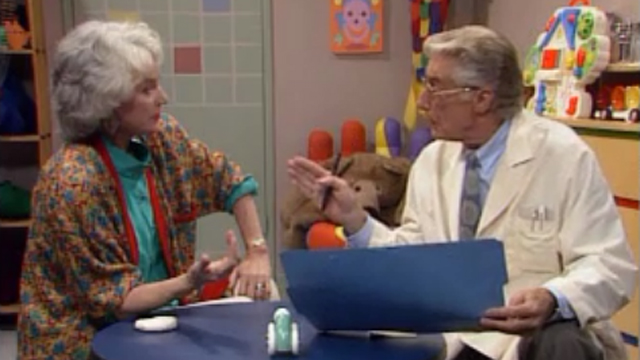In the TV show The Golden Girls‘ 2-part episode titled “Sick and Tired,” Dorothy knows she isn’t well and goes to doctor after doctor, only to be told there is nothing wrong with her. When she pushes back, a few of the doctors tell her it is because she is old, or depressed, or lonely, or because she needs to get her hair done. She consults a specialist in New York, hoping for answers, and he tells her more of the same, and also seems exasperated with her for wasting his time and her money, because his other patients have real problems, unlike her.
Dorothy begins to doubt herself, but the rest of the girls tell her that they agree with her, and they can see that she is not well, and in desperation she brings the findings to her friend and next door neighbor, a pediatrician, who knows her well enough to tell there is something wrong, and sends her to a doctor who believes her and tells her she has chronic fatigue syndrome.
Dorothy is relieved to finally have a diagnosis and to know she is not crazy. They go out to celebrate, and while there, she sees the specialist in NY and confronts him about his dismissive attitude of her.
A quick google search will reveal that this 2-part episode resonated for many people. Inspired by the true illness of the show’s creator, Susan Harris, it is perhaps one of the most powerful story arcs for Dorothy, and something that I think about all throughout my health challenges.
Thinking about it this weekend, I realized some of the most important takeaways (for me) from this story:
- If you don’t feel well – see a doctor. I know people who are scared to go, afraid of what the doctor may find, or not find. Being sick may make you feel powerless. Knowing why you are sick gives you back your power because then you can come up with a game plan.
- If the game plan isn’t working, get a new game plan. If the doctor you are seeing suggest treatments or medicines that aren’t working, or tries to dismiss you, get a second opinion. And then a third opinion. And all the opinions and tests and treatments you need until you are well.
- Be your own advocate. Walk in to your appointment as prepared as you can be. If you don’t feel heard, repeat yourself. If they don’t listen, find someone who will (see #2). There was a moment in part 2 of the episode that struck a chord with me. When the specialist recommended that Dorothy see a psychiatrist, she pulled out letters from the two she had already seen stating that they believed her condition was medical, not mental. Even though he dismissed their findings, I loved that she had done her due diligence and proved she had tried standard treatments before pursuing things further. (I am already working on a blog to discuss some of the ways I’ve learned to become my own advocate.)
- Create a support team of friends and family. You do not need to go this alone. When Dorothy goes to see the doctors, her mother often accompanies her. When she sees the NY specialist, she brings Rose. Having a second person at your appointment is a second set of ears and eyes to help you remember what is said and a second voice to ask questions. I also make it a point to keep key co-workers and friends informed of any pain or issues I may be experiencing, and any medications or treatments I may be utilizing, just so that someone is aware of what is happening in case I am unable to communicate for myself.
If you haven’t already seen “Sick and Tired,” please go watch it (I found several copies of the episodes on YouTube, for starters). Remember that it was taped in 1989, so please recognize there are some cringe-worthy comments in the show (mostly said in the third act by Sophia). So take that with a grain of salt (or sodium-free substitute). If you have seen it, but it’s been a while, don’t be afraid to watch it again. Whether you are a doctor, a person struggling with illness, or just a healthy bystander – thank you for being a friend. And if the theme song is now in your head, I’ve done my job.

That type of doctor is familiar to me, even in my own work environment. Complacency & dismissiveness can be harmful in the medical field, thanks for the reminder.
Hugs.